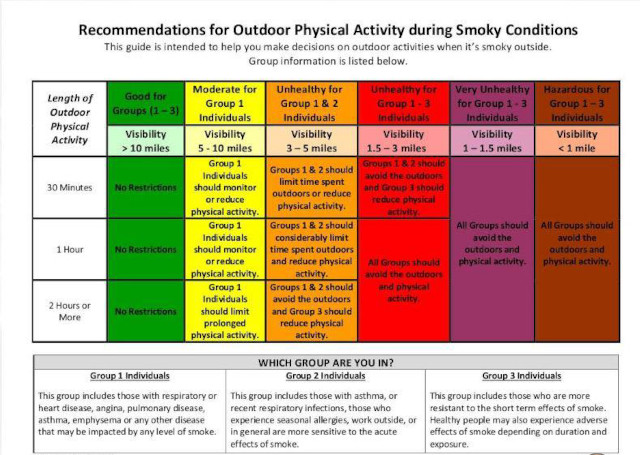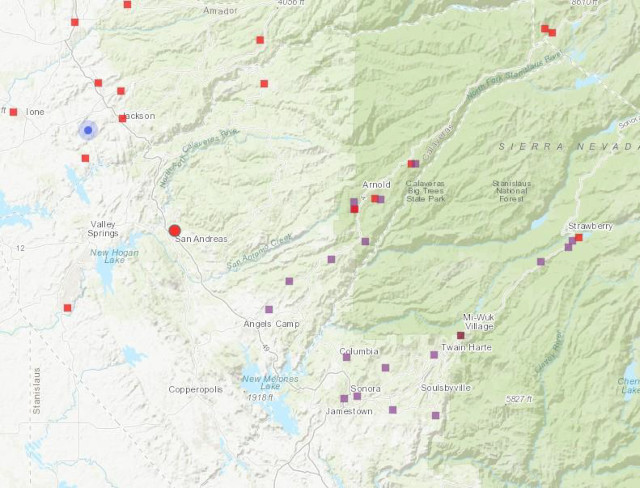San Andreas, Calif. — The Calaveras County Health Officer and Calaveras County Air Pollution Control District are issuing a joint air quality advisory to notify the public of the potential for poor air quality conditions due to drift smoke from the various fires around the State. There are currently no fires burning in Calaveras County. Please avoid adding to the drift smoke by not lighting recreational fires, even on private property. The Hwy 4 corridor from Murphys through Copperopolis and the entire Hwy 49 corridor are currently experiencing very unhealthy levels of smoke. Other areas of the County are also experiencing substantial smoke pollution. These conditions may persist for several days.


AQI (Air Quality Index) is a way to report the amount of smoke in the air. The chart on the next page shows the color designations for AQI. There is also a map that shows today’s AQI at sensor locations within the County. Note that many sensors are reporting very unhealthy air.
If you can see or smell smoke, avoid all unnecessary outdoor activities, especially if you are in an area where visibility is greatly reduced. Any persons with heart or lung health issues should remain indoors with the doors and windows closed. All persons should avoid going outdoors.
Dr. Kelaita, Public Health Officer, would like to remind the public that “The smoke we can see and measure in the air is a complex mixture of gases and very small particles made when wood and other organic materials burn. The biggest health threat is from the fine particles that penetrate deep into the lungs when we breathe. This can cause a range of health problems including aggravation of chronic lung and heart conditions. Older adults, and those with underlying health conditions, are more at risk from the harmful effects of smoke exposure.”
Here are additional ways to reduce your smoke exposure:
• Stay indoors with the windows and doors closed, if possible.
• Do not add to the smoke by starting backyard fires.
• Do not run fans that bring smoky outdoor air inside – examples include swamp coolers, whole-house fans, and
fresh air ventilation systems.
• Run your air-conditioner only if it does not bring smoke in from the outdoors. Change the standard
air-conditioner filter to a medium or high efficiency filter. If available, use the “recirculate” or “recycle”
setting on the unit.
• Limit outdoor exertion and physical activity.
• Leave the smoke-impacted areas until conditions improve, if possible.
• Reduce unnecessary driving. If traveling through smoke-impacted areas, be sure that your vehicle’s ventilation
system is on recirculate.
• Do not smoke, vacuum, fry food, or do other things that will create indoor air pollution,
• If you have asthma, take your medications and follow your asthma management plan,
• Non‐HEPA paper face mask filters and bandana-type face coverings may be helpful in reducing the spread of
germs and viruses, but they are not capable of filtering out extra fine particulates which are much smaller in
size. Therefore, they will not be helpful in protecting individuals from smoke-related impacts.
Anyone experiencing serious symptoms due to smoke should contact a health professional. Persons who have a respiratory-related illness may also wish to consult their health care provider if they are experiencing smoke exposure.
Keep in mind that air quality can change rapidly at different times during the day due to wind shifts; therefore, it is important to monitor the smoke throughout the day in your area and make outdoor plans accordingly.
Information on air quality and smoke can be found at the EPA’s Airnow updated Fire and Smoke webpage at https://fire.airnow.gov which shows particulate matter data from permanent and temporary air monitors along with low-cost sensor data and smoke plume visualizations.
The Calaveras County Air Pollution Control District will continue monitoring the air quality in the County and will provide additional advisories as air quality conditions evolve.
For more information call the Calaveras County Air Pollution Control District at (209) 754-6588 or Calaveras County Health and Human Services at (209) 754-6448.
____________________________________END_________________________________________________


